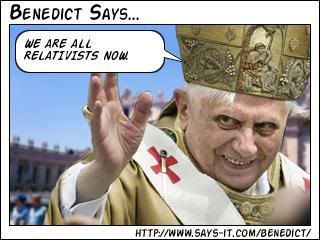Pope Benedict's reductio ad Hitlerum

I understand that there are historical reasons why when the Pope holds forth on a given topic, the world's media bends over backwards to report it. After all, his predecessors were once upon a time the most powerful leaders in the world. And yet it still bothers me that his banal brand of magical thinking is deemed newsworthy.
His latest encyclical, Spe Salvi, is being represented by many media outlets as a scathing attack on atheism, in response to the success of recent atheism-themed books by Sam Harris, Christopher Hitchens, Daniel Dennett and Richard Dawkins. Talk about being hit with a wet newspaper . . .The atheism of the nineteenth and twentieth centuries is—in its origins and aims—a type of moralism: a protest against the injustices of the world and of world history. A world marked by so much injustice, innocent suffering, and cynicism of power cannot be the work of a good God. A God with responsibility for such a world would not be a just God, much less a good God. It is for the sake of morality that this God has to be contested.
Do we not hear in these words the echo of a thousand online "concern troll" theists? "I understand: you're an atheist because you're angry at God. It can't possibly be because of the lack of evidence that a God exists. So it must be the anger thing." Since there is no God to create justice, it seems man himself is now called to establish justice. If in the face of this world's suffering, protest against God is understandable, the claim that humanity can and must do what no God actually does or is able to do is both presumptuous and intrinsically false. It is no accident that this idea has led to the greatest forms of cruelty and violations of justice; rather, it is grounded in the intrinsic falsity of the claim. A world which has to create its own justice is a world without hope.
No, Benedict: a world which has to create its own justice--and is aware of that fact--is a world that has finally weaned itself off the teat of religious dogma, cast aside the security blanket, and grown up. The cruelty and violations of which you speak--namely those caused by totalitarian regimes in the twentieth century--are simply the fruits of one set of dogmas being replaced with another. I'll say that again so that it might sink in. The cruelty and violations of which you speak are the fruits of dogma, not atheism. Your mistake is in your severe tunnel-vision, which is such that you cannot begin to countenance the thought that we might cast aside dogmatic thought altogether.

















|